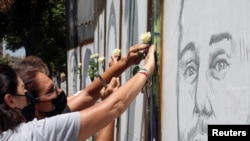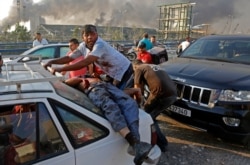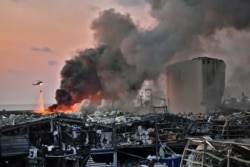Human Rights Watch has issued a report saying strong evidence suggests some Lebanese officials were aware of, and tacitly accepted, the danger posed by improperly stored ammonium nitrate at Beirut’s port. A blast at the port on August 4, 2020, left nearly 220 people dead and swaths of the capital in ruins.
The Human Rights Watch report found evidence implicating a number of Lebanese authorities as criminally negligent under Lebanese law for causing the disaster, recorded as one of the largest non-nuclear explosions in history. It has also called for an investigation by the U.N. Human Rights Council and for those implicated to face sanctions.
Aya Majzoub is the Lebanon researcher at Human Rights Watch Beirut. She told VOA that the report was given to Lebanese officials, but only a few responded and with denials of responsibility.
“There wasn’t a single Lebanese official who accepted their role in such a huge catastrophe. We are calling on the U.N. Human Rights Council to dispatch an investigative mission to investigate the Beirut blast, including who was responsible, besides individual responsibility, what the Lebanese state’s responsibility to act was and how they failed in their responsibilities to protect the public’s human rights,” she said.
The international rights group also says systemic problems in Lebanon’s legal and political system are allowing officials to avoid accountability. Rampant corruption has eroded Lebanon's governing system. Analysts and activists alike have called for the corruption in the system to be uprooted.
According to the Reuters news agency, the presidential palace offered no response when contacted about the report. Other senior officials also did not comment.
Many Lebanese, meanwhile, continue to struggle with the destruction and the loss of loved ones in the trauma that ensued.
A Lebanese Catholic nun, Sister Marlene Youssef of the Daughters of Charity organization, runs a non-profit school for 300 students in Beirut’s Achrifiyya district, about a kilometer above the port area.
The nun said she was on the roof of the connecting convent when she saw a fire in the port and heard a loud explosion. She told VOA the scene frightened her, and that she ran into an elevator to go down. She was inside the lift when the second massive blast erupted and being inside it is what saved her. Her sole colleague, another nun named Sister Sophia, was not as fortunate.
“All over, the place was destructed inside: the equipment, the doors, the windows. Everything was smashed and the glass was everywhere. If I was anywhere inside, I would have a lot of damages and surely, I was dead. But my Sister Sophia was there on the balcony in front of the port. She couldn’t stand in front of the blast. She was bleeding. She couldn’t make it. I was traumatized. In a few seconds, we lost everything, persons, everything around us. It wasn’t easy to accept it,” she said.
Sister Marlene Youssef is in the process of rebuilding the premises and her life.
Sixty-seven-year-old Waleed Taha said he had been fishing near the port and got into his car when the powerful, second explosion struck. He told the Saudi Arab News newspaper that “the car was thrown into the sea — but the waves, which were as high as a 10-story building, threw us back to where we were.”
Taha said he lost consciousness until his son came looking for him in the rubble.
Many Lebanese say the psychological wounds run deep and even if justice is achieved, there will always be a lingering reminder in Beirut of the tragedy.






